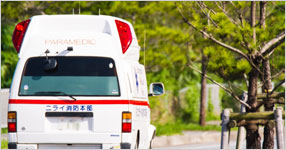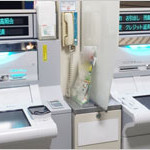Emergency Contact Numbers
The following numbers are emergency codes and are should not be used for inquiries.
It is also possible to call any of these numbers from a public phone for free. All you have to do is pick up the receiver, press the red SOS button, then dial the relevant emergency code.
110: For the police
119: For the fire services
119: For an ambulance
Other useful numbers include:
03-3501-0110: Police line in English
Theft & Crime
According to the Global Peace Index created by the Institute for Economics and Peace, Japan is the 8th safest country in the world and scored the lowest possible rating on a 1-5 scale for homicides, organized conflict (internal), violent demonstrations, violent crimes, terrorist activity and deaths from conflict, among other things.
Koban
For this reason, visitors should have no problem with crime as long as they use common sense (don't walk down dark alleyways at night, don't leave your luggage unattended etc). On the small off-chance of being involved in a crime, victims should locate their nearest 'koban' (police box) and report it straight away. Koban are small, local stations which are manned by a police officer 24 hours a day. You can also come here if you have lost something valuable to find out if it has been handed in. Koban can be identified by the sheriff-star style symbol hanging above the entrance.
Natural Disasters
While crime is not something expats and visitors need to worry too much about, Japan is prone to a variety of natural hazards and adverse weather conditions. However, it is worth noting that serious disasters occur very infrequently and you are only a fraction more likely to be caught up in one in Japan than in other disaster-prone countries like the US.
Much like the USA, different parts of Japan are susceptible to different types of natural occurrences; for example, large earthquakes and tsunamis are more likely to happen around the north-east of the country, while typhoons are more likely to affect the south-western islands of Kyushu and Okinawa. Small earthquakes occur almost daily in parts of the country, but these are 'normal' and nothing to worry about as Japanese buildings are built to withstand small tremors.
General Safety Tips & Procedures:
—Make sure to register with your country's embassy in Japan as soon as possible. This way they will know if you have been caught up in an emergency in your area much more quickly, so they can help you and also respond to your relatives back home.
—Subscribe to mobile alerts for weather and earthquake warnings in your area.
—Find out about standard safety procedures in case of an emergency (for example, you should duck under a desk if there is an earthquake).
—Find out where your nearest evacuation site is located. These are usually schools, temples or other places in elevated locations.
—Pay attention to any weather warnings made on the TV or radio.
—Keep an emergency water supply, flashlight and wind-up radio ready at all times in case something happens.
—Listen for emergency announcements made on the city broadcast system if they come on.
The Role of Embassies
You should always register with your country's embassy if you move abroad so they can help you in times of crisis. However, what exactly do embassies do other than this?
Services that Embassies provide:
—Visa renewal
—Travel advice, information and updates for Japan
—Information targeted to nationals from your country about living in Japan
—Links to interpreters, translators, lawyers and counsellors in Japan
—Help you if you have become the victim of a crime
—Help you in the case of an emergency, such as natural disaster
—Offer a degree of assistance if you have been detained
—Contact your family for you
Services they DO NOT provide:
—Help if you have been arrested, such as getting you out of prison or preventing you from being deported
—Give you legal advice in the case of a legal problem
—Arrange better conditions in hospital or prison
—Help with finding you work or accommodation
For a list of foreign embassies in Japan: Click here.
Our tips:
1) Spend some client entertainments and secure business – they are mostly tax deductible – up to 8 million yen.
2) Make sure cost per head will not exceed the limitation of 5,000 yen.
3) Make sure to receive a proper receipt and Keep details of participants.
However, we do not take responsibility should there be any inaccuracies or incorrect information shown.
Please use your own judgement about what you read here – From the organisers of japanbizguide.com





